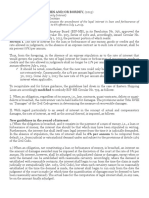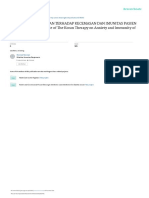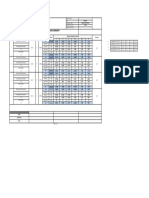Question: How Can A Person Recover The Bank Deposits Left by The Deceased?
Question: How Can A Person Recover The Bank Deposits Left by The Deceased?
Uploaded by
Cirila TatlongarawCopyright:
Available Formats
Question: How Can A Person Recover The Bank Deposits Left by The Deceased?
Question: How Can A Person Recover The Bank Deposits Left by The Deceased?
Uploaded by
Cirila TatlongarawOriginal Description:
Original Title
Copyright
Available Formats
Share this document
Did you find this document useful?
Is this content inappropriate?
Copyright:
Available Formats
Question: How Can A Person Recover The Bank Deposits Left by The Deceased?
Question: How Can A Person Recover The Bank Deposits Left by The Deceased?
Uploaded by
Cirila TatlongarawCopyright:
Available Formats
Copyright May 24, 2019
Atty. Sheryl Sollestre-Caballes
Question: How can a person recover the bank deposits left by the deceased?
Republic Act No. 10963 known as the Tax Reform for Acceleration and Inclusion (TRAIN) was
approved on 19 December 2017 and took effect on 01 January 2018. Section 27 of TRAIN Law
amends Section 97 of Republic Act 8424, otherwise known as the National Internal Revenue
Code (NIRC) of 1997.
NIRC vs. TRAIN
Section 97 of the NIRC states:
SEC. 97. Payment of Tax Antecedent to the Transfer of Shares, Bonds or Rights.- There shall not
be transferred to any new owner in the books of any corporation, sociedad anonima, partnership,
business, or industry organized or established in the Philippines any share, obligation, bond or
right by way of gift inter vivos or mortis causa, legacy or inheritance, unless a certification from
the Commissioner that the taxes fixed in this Title and due thereon have been paid is shownIf a
bank has knowledge of the death of a person, who maintained a bank deposit account alone, or
jointly with another, it shall not allow any withdrawal from the said deposit account, unless the
Commissioner has certified that the taxes imposed thereon by this Title have been paid:
Provided, however, That the administrator of the estate or any one (1) of the heirs of the
decedent may, upon authorization by the Commissioner, withdraw an amount not exceeding
Twenty thousand pesos (P20,000) without the said certification.
For this purpose, all withdrawal slips shall contain a statement to the effect that all of the joint
depositors are still living at the time of withdrawal by any one of the joint depositors and such
statement shall be under oath by the said depositors.
The amendment under Section 27 of the TRAIN Law is as follows:
“Sec. 97. Payment of Tax Antecedent to the Transfer of Shares, Bonds or Rights.— x x x.
“If a bank has knowledge of the death of a person, who maintained a bank deposit account alone,
or jointly with another, it shall allow any withdrawal from the said deposit account, subject to a
final withholding tax of six percent (6%). For this purpose, all withdrawal slips shall contain a
statement to the effect that all of the joint depositors are still living at the time of withdrawal by
any one of the joint depositors and such statement shall be under oath by the said depositors.”
Thus, to be able to claim the bank deposits of the deceased person, first look at the date of death
to determine which law shall apply.
If the person who owns the bank account died prior to 01 January 2018, the NIRC shall apply. If
the death occured on or after 01 January 2018, the TRAIN Law shall be applicable.
How to recover deposits under the TRAIN LAW
Copyright May 24, 2019
Atty. Sheryl Sollestre-Caballes
BIR Revenue Memorandum Circular No. 62-2018 has the answer. The circular provides that the
"executor, administrator, or any of the legal heir/s of a decedent who, prior to death, maintained
bank deposit/s may be allowed withdrawal from the said bank deposit account/s within 1 year
form the date of death of the depositor/joint depositor but the amount withdrawn shall be subject
to 6% final withholding tax."
Paragraphs 3 and 4 of the Circular stated further:
"3. Prior to such withdrawal. the Bank shall require the executor, administrator, or any of the
legal heir/s withdrawing from the deposit account to present a copy of the Tax Identification
Number (TIN) of the estate of the decedent and BIR Form No. 1904 of the estate, duly stamped
received by the concerned Revenue District Office (RDO) of the Bureau of Internal Revenue in
accordance with the existing guidelines on the issuance of TIN:
4. The bank shall issue the corresponding BIR Form No. 2306 certifying the withholding of six
percent (6%) final tax...."
To simplify:
If the deceased died after 01 January 2018, Section 27 of the TRAIN Law which amends section
97 of the NIRC shall apply.
For this purpose, the executor, administrator, or any of the legal heir/s can file a claim with the
bank to withdraw the amount on the deposit accounts. The bank will allow such withdrawal upon
the presentation of its required documents (ask the bank for the list of requirements) and upon
the presentation of BIR Form 1904 with the estate tax number the estate of the deceased.
The bank shall issue withdrawal slips for the executor, administrator, legal heir, to sign which
shall include a statement that deposits withdrawn is subject the 6% final withholding tax.
Thereafter, the amount net of final tax can be withdrawn and the proceeds given to the proper
party.
You might also like
- BairdDocument6 pagesBairdShaniel T Hunter100% (1)
- COA Resolution Number 2015-031Document3 pagesCOA Resolution Number 2015-031gutierrez.dorie100% (7)
- Regulatory Guide to Money Transmission & Payment Laws in the U.S.From EverandRegulatory Guide to Money Transmission & Payment Laws in the U.S.No ratings yet
- (HANDOUT) Unbeatable Growth Hacking StrategyDocument60 pages(HANDOUT) Unbeatable Growth Hacking StrategyHarnendio Aditia Nugroho0% (1)
- Tax - ProjectDocument14 pagesTax - ProjectFatima BrionesNo ratings yet
- Amendements To Estate TaxDocument7 pagesAmendements To Estate TaxSepha PagdangananNo ratings yet
- Joint Depositors and RA 10963Document4 pagesJoint Depositors and RA 10963Rey Alexander PalmaresNo ratings yet
- Mindanao Shopping v. Davao CityDocument7 pagesMindanao Shopping v. Davao CityPaul Joshua SubaNo ratings yet
- Estate-Tax Changes Under Train LawDocument4 pagesEstate-Tax Changes Under Train LawJennifer ArcadioNo ratings yet
- Digest RR 8-2019Document2 pagesDigest RR 8-2019Nikki GarciaNo ratings yet
- BFSMB v. NavarroDocument15 pagesBFSMB v. NavarroCamille BugtasNo ratings yet
- Banking: Unclaimed Balances and Trust ReceiptsDocument46 pagesBanking: Unclaimed Balances and Trust ReceiptsGela Bea Barrios100% (1)
- Republic Act NoDocument2 pagesRepublic Act Nojeb666No ratings yet
- Credit - NACAR Vs Gallery FramesDocument3 pagesCredit - NACAR Vs Gallery FramesKT100% (1)
- PDIC CharterDocument6 pagesPDIC CharterIris Fabiaña BatillerNo ratings yet
- Things To RemeberDocument19 pagesThings To Remebermammas collectionNo ratings yet
- Yawa KaDocument23 pagesYawa KaAlex FunnelNo ratings yet
- Updates On TaxDocument57 pagesUpdates On TaxSamuel CrawfordNo ratings yet
- Prisma Construction & Dev Corp Vs Menchavez DigestDocument1 pagePrisma Construction & Dev Corp Vs Menchavez DigestClarissa DegamoNo ratings yet
- Debt CollectionDocument4 pagesDebt CollectionLM RioNo ratings yet
- Unclaimed Balances LawDocument17 pagesUnclaimed Balances LawFritchel Mae QuicosNo ratings yet
- Improvements) Situated at 1 Fatima Lane, Marikina, and More Particularly Described AsDocument6 pagesImprovements) Situated at 1 Fatima Lane, Marikina, and More Particularly Described AsNN DDLNo ratings yet
- TD 2017-011 Who Should Be Assessed To Interest On Bank AccountsDocument4 pagesTD 2017-011 Who Should Be Assessed To Interest On Bank Accountsjo lamosNo ratings yet
- RR 2-98 (As Amended)Document74 pagesRR 2-98 (As Amended)Mariano RentomesNo ratings yet
- Provision Related To Advance Payment of TaxDocument8 pagesProvision Related To Advance Payment of TaxBISHWAJIT DEBNATHNo ratings yet
- LOPEZ v. CA 1992Document8 pagesLOPEZ v. CA 1992Chedeng KumaNo ratings yet
- What Is The Purpose of PDIC LawDocument4 pagesWhat Is The Purpose of PDIC LawGelyn OlayvarNo ratings yet
- Picop VS SSS, BelizarDocument2 pagesPicop VS SSS, BelizarEarvin Joseph BaraceNo ratings yet
- DicgcDocument11 pagesDicgcPranav ShahNo ratings yet
- ABS-CBN v. CTA, G.R. No. L-52306, 12 October 1981Document10 pagesABS-CBN v. CTA, G.R. No. L-52306, 12 October 1981Jennilyn Gulfan YaseNo ratings yet
- Laws On Other Business Transactions: Philippine Deposit Insurance Corporation (PDIC) LawDocument15 pagesLaws On Other Business Transactions: Philippine Deposit Insurance Corporation (PDIC) LawAlliahDataNo ratings yet
- RA 9576 April 29,2009: Section 1 State Policy and Objectives: Policy of The State To Generate, Preserve, Maintain FaithDocument4 pagesRA 9576 April 29,2009: Section 1 State Policy and Objectives: Policy of The State To Generate, Preserve, Maintain FaithDaryl Mae MansayNo ratings yet
- Tax 1.1Document13 pagesTax 1.1Mheryza De Castro PabustanNo ratings yet
- Banco Filipino Vs NavarooDocument10 pagesBanco Filipino Vs NavarooHv EstokNo ratings yet
- Security Bank and Trust Co vs. RTC MakatiDocument3 pagesSecurity Bank and Trust Co vs. RTC Makaticmv mendozaNo ratings yet
- Amnisty For Tax and Custom DutiesDocument12 pagesAmnisty For Tax and Custom DutieserishysiNo ratings yet
- Tayug Rural Bank vs. Central BankDocument3 pagesTayug Rural Bank vs. Central BankJemarie Arisga100% (1)
- Republic of The Philippines Court of Tax Appeals Quezon CityDocument11 pagesRepublic of The Philippines Court of Tax Appeals Quezon CityCJNo ratings yet
- A Study On 269SS & 269 TDocument4 pagesA Study On 269SS & 269 TsivaranjanNo ratings yet
- PNB Fixed Deposit FormDocument6 pagesPNB Fixed Deposit FormANKITNo ratings yet
- GTC New Format - UpdatedDocument8 pagesGTC New Format - Updatedd surviNo ratings yet
- How To Deal With Dishonoured Cheques in Pakistan 1728748485Document5 pagesHow To Deal With Dishonoured Cheques in Pakistan 1728748485Nasir MengalNo ratings yet
- RMC 58-2008 PDFDocument3 pagesRMC 58-2008 PDFChristineNo ratings yet
- Credit Transactions Batch 2 (Feb 15, 2018)Document28 pagesCredit Transactions Batch 2 (Feb 15, 2018)Carmel LouiseNo ratings yet
- Amendment AmlaDocument4 pagesAmendment AmlabednarmsNo ratings yet
- The Zakat and Ushr Ordinance, 1980: UpdatedDocument26 pagesThe Zakat and Ushr Ordinance, 1980: UpdatedJam Imran MadniNo ratings yet
- Villarica Pawnshop, Inc, Et Al. vs. Social Security CommissionDocument2 pagesVillarica Pawnshop, Inc, Et Al. vs. Social Security CommissionAweGooseTree100% (3)
- 6 QC Vs ABS CBNDocument17 pages6 QC Vs ABS CBNBLNNo ratings yet
- Section 11 BankingDocument6 pagesSection 11 BankingMay TanNo ratings yet
- Preliminary Assessment Notice and Final Assessment NoticeDocument5 pagesPreliminary Assessment Notice and Final Assessment NoticeGuiltyCrown0% (1)
- Bank Secrecy Unclaimed Balances and Truth in LendingDocument25 pagesBank Secrecy Unclaimed Balances and Truth in LendingvalmadridhazelNo ratings yet
- Harteau Release of All Claims Final 8.30.17Document7 pagesHarteau Release of All Claims Final 8.30.17Adam BelzNo ratings yet
- Ra 9480Document6 pagesRa 9480cmv mendozaNo ratings yet
- 'The Deposit Insurance and Credit Guarantee Corporation' (DICGC-India)Document5 pages'The Deposit Insurance and Credit Guarantee Corporation' (DICGC-India)Veeraswamy AmaraNo ratings yet
- State Secrets New Central Bank Act (RA 7653)Document3 pagesState Secrets New Central Bank Act (RA 7653)jmclacasNo ratings yet
- Business and Industrial Law.Document8 pagesBusiness and Industrial Law.ZubyrKhanNo ratings yet
- 2 - VillaricaDocument63 pages2 - VillaricaMosesNo ratings yet
- Special LawsDocument12 pagesSpecial LawsRey Josh Angelo RicamaraNo ratings yet
- Unclaimed BalancesDocument6 pagesUnclaimed Balancesnorzham.saranganiNo ratings yet
- Bar Review Companion: Taxation: Anvil Law Books Series, #4From EverandBar Review Companion: Taxation: Anvil Law Books Series, #4No ratings yet
- Structured Settlements: A Guide For Prospective SellersFrom EverandStructured Settlements: A Guide For Prospective SellersNo ratings yet
- Erro TES Doc EntradaDocument184 pagesErro TES Doc EntradaLucas CostaNo ratings yet
- Steel Panthers - MBT Game GuideDocument205 pagesSteel Panthers - MBT Game GuideSeth VanEyckNo ratings yet
- Literature Review On OvenDocument8 pagesLiterature Review On Ovenea442225100% (1)
- Release Notes: Production Operations Software Platform 2017.2Document18 pagesRelease Notes: Production Operations Software Platform 2017.2boualem.iniNo ratings yet
- Pro Resume With Blog and Headshot PDFDocument1 pagePro Resume With Blog and Headshot PDFBella BrewerNo ratings yet
- Manila Int ClimateDocument3 pagesManila Int ClimateStephanie ChenNo ratings yet
- Franked Anti Ragging StudentDocument2 pagesFranked Anti Ragging StudentNikunjNo ratings yet
- Brand EquityDocument38 pagesBrand Equityzsjkc20No ratings yet
- Jurnal Terapi ALQuranDocument7 pagesJurnal Terapi ALQuranJazoeli Hipnoterapi BanjarmasinNo ratings yet
- Quiz Round 2Document80 pagesQuiz Round 2Tirupal PuliNo ratings yet
- Jtag 1Document12 pagesJtag 1lavanyaNo ratings yet
- Akhs Knightly News: Mid-Term Transcript ProceduresDocument3 pagesAkhs Knightly News: Mid-Term Transcript Proceduresapi-198044962No ratings yet
- TSHR 6000 User Manual V1.3Document122 pagesTSHR 6000 User Manual V1.3pramodyad5810No ratings yet
- Apache Egypt 2008 EIA Pre-Seismic and Drilling ActivitiesDocument182 pagesApache Egypt 2008 EIA Pre-Seismic and Drilling ActivitiesКоля БігунNo ratings yet
- Notes of Consumer-BehaviourDocument338 pagesNotes of Consumer-BehaviourRajat Nitika Verma90% (41)
- Tsicet - 2023 ScheduleDocument1 pageTsicet - 2023 Scheduleiamsiv foodNo ratings yet
- 7 Tests That You Need On The Steel StructureDocument6 pages7 Tests That You Need On The Steel StructureBBGNo ratings yet
- CINEC - Syllabus - Electronics and TelecommunicationsDocument35 pagesCINEC - Syllabus - Electronics and TelecommunicationsCrystolac PaintsNo ratings yet
- Department of Computer Science BSC (Hons) Project ProposalDocument7 pagesDepartment of Computer Science BSC (Hons) Project Proposalfrediizee WinsNo ratings yet
- Facile Synthesis of Indolo (3,2-A) Carbazoles Via Pd-Catalyzed Twofold Oxidative CyclizationDocument5 pagesFacile Synthesis of Indolo (3,2-A) Carbazoles Via Pd-Catalyzed Twofold Oxidative CyclizationWalid Ebid ElgammalNo ratings yet
- Positive Material Identification-Summary: 8/4/2020 Spectro Test Txc03Document1 pagePositive Material Identification-Summary: 8/4/2020 Spectro Test Txc03norman moralesNo ratings yet
- Silo - Tips Oracle 11g r2 Grid Infrastructure Installation On 2 Node Cluster Using VirtualboxDocument29 pagesSilo - Tips Oracle 11g r2 Grid Infrastructure Installation On 2 Node Cluster Using VirtualboxTAHA KANNANENo ratings yet
- Quiz 2Document2 pagesQuiz 2I.E. Business SchoolNo ratings yet
- Soal Eng Level 3 Omnas 12Document7 pagesSoal Eng Level 3 Omnas 12Adba ArsitekturNo ratings yet
- New Technologies: Airbus A350-XWBDocument1 pageNew Technologies: Airbus A350-XWBkavyaajay884668No ratings yet
- Ejercicios Present TensesDocument4 pagesEjercicios Present TensesAlejandra ÁlvarezNo ratings yet
- HU501 Economics For EngineersDocument1 pageHU501 Economics For EngineersMyWBUT - Home for Engineers33% (3)
- 16-1102 Views of The United StatesDocument32 pages16-1102 Views of The United StatesFlorian MuellerNo ratings yet
- CHAPTER 10.5-Distance Time Graphs2Document13 pagesCHAPTER 10.5-Distance Time Graphs2Shweta BharrgavNo ratings yet

























































































